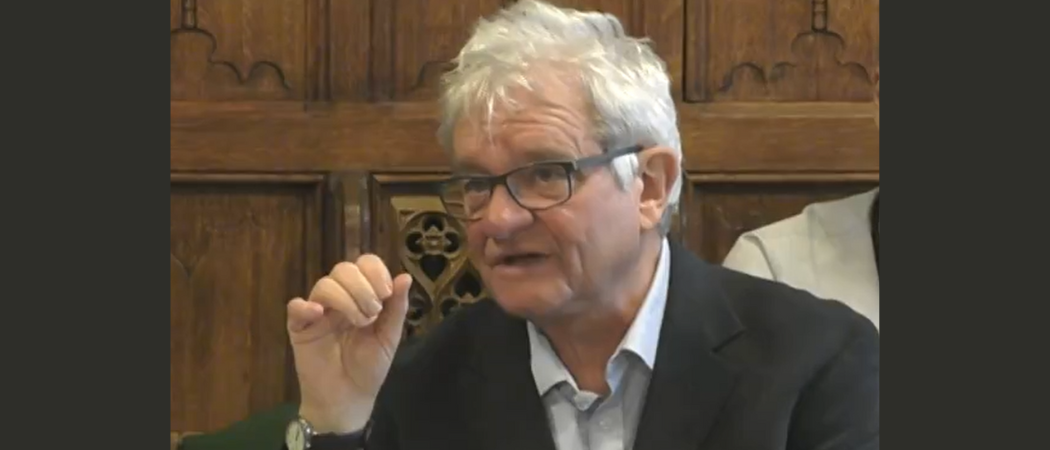Science leaders once more make the case for UK joining the €95.5B research programme. ‘Association with Horizon is crucial for the success of UK science and therefore the future of our country’, MPs are told

Paul Nurse, director of the Francis Crick Institute, London. Photo: UK Parliament
Academics in the UK have urged the government to get the Horizon Europe association deal over the line to limit the damage that the two-year delay - and counting – is having on research cooperation with peers in Europe.
“The government should just get association done,” said Paul Nurse, director of the Francis Crick Institute, echoing the infamous ‘Get Brexit done’ slogan used by the Conservative Party in the December 2019 election.
Nurse was giving evidence to the House of Commons science and technology committee on Wednesday, less than two weeks after the UK government announced its ‘Plan B’, the £14.6 billion Pioneer research programme it will fall back on if Horizon Europe talks between Brussels and London fail.
But, Nurse told MPs, the launch of the Pioneer plan is sending mixed messages, both to the EU and to researchers in the UK, casting doubts about the government’s commitment to getting a deal done with Brussels. “I think we are dithering too much, frankly,” he said.
Nurse is a Nobel Laureate and the author of a government-commissioned review of R&D published in March, in which he stressed relationships with EU collaborators need to be protected, maintained and expanded.
Frustration is growing because the way to association was meant to have been cleared in March, after UK prime minister Rishi Sunak and Commission president Ursula von der Leyen signed the Windsor framework, ending a high-level political row over the status of Northern Ireland in the EU single market.
When Michelle Donelan, UK secretary of state for science, innovation and technology visited Brussels earlier this month to get the negotiations moving, she said the UK is still committed to Horizon Europe association, but is working on the Pioneer programme, in case the negotiations break down.
The government had initially pointed to disagreements over the UK’s financial contribution to the EU research programme as a potential reason for disagreement with Brussels, but the European Commission confirmed the UK will not be required to pay for the two years it has been locked out of the programme.
“My understanding is that the EU financial deal is generous and recognises the two-year hiatus, which was a possible sticking point,” Nurse said. “So, I see there no excuse whatsoever not to associate.”
Another sticking point could be the scope of the UK’s participation in the EU funding programme. If the UK tries to cherry pick parts of Horizon Europe it wishes to join, then the two sides are running the risk of reopening the post-Brexit trade agreement, which stipulated the terms of Horizon Europe association.
Adrian Smith, president of the Royal Society told MPs that reopening the trade agreement with the EU would be “a stupid complication”.
The UK research establishment is still pushing for Horizon Europe association but points to hesitant ministers who are delaying things. Nurse lamented the fact that prime minister Sunak has not publicly stated his preference for Horizon Europe and claimed he is not really listening to researchers. “I think the prime minister might be dragging his feet, if I can be frank about it,” he said.
In February, Smith coordinated a letter to Sunak signed by 15 Nobel Laureates, including Nurse, in which they tried to persuade the prime minister of the importance on joining Horizon Europe. It is perhaps symptomatic of his lack of enthusiasm that Sunak did not reply until earlier this week. However, “In that letter, the prime minister did personally state his preference for association,” Smith said.
When does it becomes too late?
The clock is ticking, and the European Commission is already getting ready for a midterm review of the 2021 - 2027 research programme. Carol Monaghan MP raised the question of when it becomes too late for association to make sense for the UK.
Adam Tickell, vice chancellor of Birmingham University believes a deal is close, but told the committee it will be hard to make up for lost time. “UK scientists tend to be very successful at the beginning of the programme and then it tails off, and so missing the first two years is regrettable,” he said.
Smith hopes a deal will happen in the coming months, preferably before the backup scheme, designed to help UK researchers who succeed in European Research Council competitions, comes to an end. The backup funding has been extended recently but will expire again in June. “There's a mood of optimism. [I’m] much heartened by the personal commitment of [Donelan] to achieving this,” said Smith.
Irene Tracey, vice chancellor of Oxford University hopes the UK will be part of Horizon Europe before the next academic year starts. “The September-October period is when we tend to induct a lot of new people, so in terms of the welcome, the arrival of talent, it will be fantastic to have a result in the next few months,” she said.
The two-year delay has produced a lot of uncertainty and anxiety, said Ottoline Leyser, chief executive of the government science funding agency UK Research and Innovation. An association deal would lift morale in the research sector. “It would be great to get through that and out the other side and into full steam ahead, if we can get through the negotiations with a good financial deal for the UK,” Leyser said.





 A unique international forum for public research organisations and companies to connect their external engagement with strategic interests around their R&D system.
A unique international forum for public research organisations and companies to connect their external engagement with strategic interests around their R&D system.